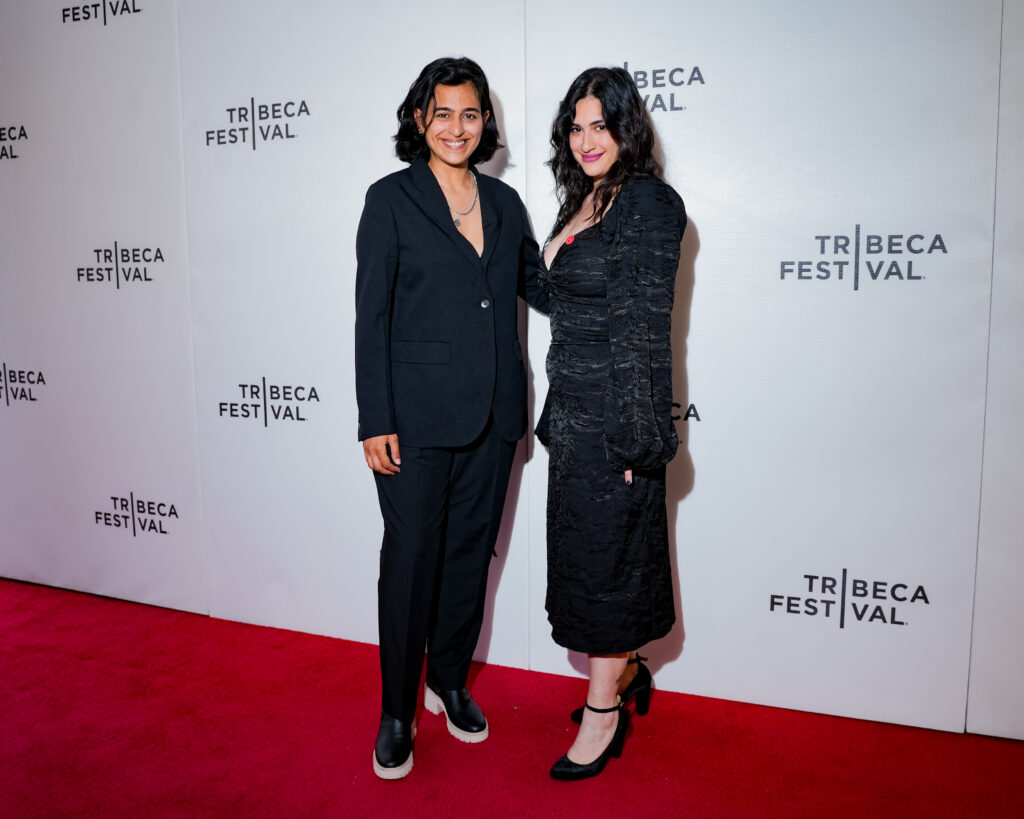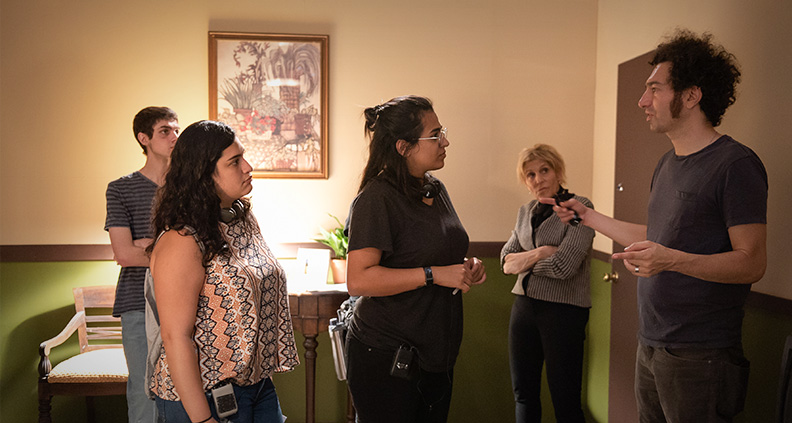‘Arzé’: A Vibrant Portrait Across Beirut That Has Become Lebanon’s Official Oscar Submission
Editor’s Note: This article was originally published in June ahead of it’s North American premiere at the TribecaFestival. Film Independent Presents a theatrical screening of Arzé (Lebanon’s Official Submission to the Academy Awards) which will be followed an in-person conversation with director Mira Shaib on Friday, November 8th.
***
A film touching on serious subjects with lightness and humor, Arzé is a unique concoction. Ostensibly about the many different sectarian communities that make up Beirut, it becomes a heartfelt story about the family dynamic between two middle-aged sisters finding company and solace in each other as they raise a young man–son to one, beloved nephew to the other. All of this is wrapped in a timely contemporary comedy springing from a single incident: the theft of a scooter the family relies on to deliver pies they make and sell.
As director Mira Shaib puts it, “We wanted to say things as straightforward as possible. And we wanted to do them in a humorous way because we don’t want people to take them to heart. In Lebanon, sectarianism and religious issues are sensitive.”
In the film the protagonist Arzé (Diamand Abou Abboud) travels through the city, each time changing her accent and attire to fit in with the inhabitants of the neighborhood she’s visiting. Since she needs their help to find the missing scooter, she figures the best way is to pretend she’s from their tribe.
While this plot may sound Lebanese-specific, Shaib thinks it will be recognizable to audiences everywhere. “It feels like a Lebanese story because of the focus on sectarianism and diversity in Beirut. However, a big part of the film is the connections between the characters; the two sisters and the son. All of those small details that make the story universal.”
The film was shot on location in Beirut in a tight 23 days and an expansive 21 locations. To capture the essence of the city and its people, producer Zeina Badran sought permissions beyond the usual ones issued by the authorities. “We had to actually go and ask people who lived where we wanted to shoot. And honestly, they were very helpful. People were fascinated by our cast and crew. We’d see them gathered in balconies watching what was going on. Sometimes they’d recognize the actors. It was nice to see that kind of spirit.”

Abou Abboud and Betty Taoutel, who plays the other sister, are well-known established actors in Lebanon and the Arab world. In fact, Abou Abboud teaches acting and directing at a Lebanese university. So, it’s no surprise that they build a credible and instantly recognizable history between their characters that the script avoids, wisely. There’s no need to explain this relationship; the two actors wonderfully play off each other hinting at the complicated feelings between these characters.
As a first-time feature director, Shaib concentrated on building a basis of trust with the actors. “I learned a lot from them. There’s a lot of stuff that I know now that I’m going to take with me for my next movie and use to direct other actors. Especially if I’m working with non-professional actors.”
Inspired by the methods of French auteur Robert Bresson, Shaib looked for a non-professional actor to play Arzé’s son, Kinan. “We wanted to find someone living as close to the situation the character is going through in the film.” Bilal Al Hamwi was up for the task and more. “I think he fit really well and got the character. We had an acting coach who worked with him. It was not an easy journey because we were limited with time. However, if I had more time, I would have done more workshops, more rehearsals with him… but I’m happy he held his own with the professional actors.”

Arzé, written by Louay Khraish and Faissal Sam Shaib–also producers on the film–was shepherded through different programs that support upcoming and mid-career filmmakers, including Global Media Makers (GMM), an intensive artist development exchange produced by Film Independent.
Badran hopes Arzé opens doors for others in Lebanon. “I believe it will give hope to young filmmakers to see that Mira and I have struggled for seven years yet it paid off. Hopefully, others will struggle for a shorter time and their stories will be made and told.” She continues, “Making films in Lebanon, and in the region generally, is tough, and it’s getting tougher year by year. I feel very lucky and blessed that Mira and I had the chance to make this film. And it’s really thanks to GMM. It’s thanks to the Red Sea production film fund and the many mentors and people that we met along the way. We consider ourselves lucky.”
Global Media Makers (GMM) is an in-depth, intensive artist development exchange program that produces residencies for international mid-career writers, directors, and producers in film and television. GMM fosters networks between U.S. industry leaders and mid-career film and TV professionals around the world. GMM is a cultural diplomacy initiative of the U.S. Department of State’s Bureau for Educational and Cultural Affairs (ECA) and implemented by Film Independent.
For over 40 years, Film Independent has helped filmmakers get their projects made and seen. The nonprofit organization’s core mission is to champion creative independence in visual storytelling and support a community of artists who embody diversity, innovation and uniqueness of vision.
Film Independent Members watch nominees and vote for the winners of the Spirit Awards. To become a Member of Film Independent and make your vote count for next year’s 40th Annual Spirit Awards, just click here. To support our mission with a donation, click here.
